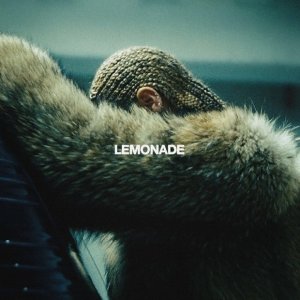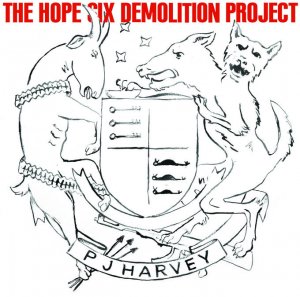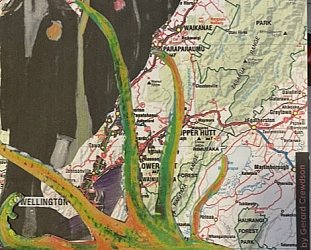Graham Reid | | 5 min read
Chain of Keys by PJ Harvey

Whether you think Beyonce's new album/hour-long film Lemonade is an openly autobiographical letter paying out on the infidelities of her husband Jay Z or just another clever piece of PR positioning, hardly matters.
The “visual album” Lemonade – as in, “if life gives you lemons . . . “ – is actually an exceptional multi-media piece of work . . . with high art photo shoots positioning the multi-millionairess as a po' Southern sista in some pre-Civil War imagery. Or as a sex goddess.
But with spoken word passages in the film, sadness at the betrayals and unconfined fury in other places, Beyonce delivers a compelling, open-letter to other women who have felt betrayed.
And it is betrayal of trust (“they don't love you like I love”) more than the mere act of cheating which she addresses. It is the emotional consequences of that which she explores, looking at the betrayal through different side of a prism.
That makes it much smarter than perhaps the tabloid headlines might lead you to believe.
But her album/film/story has it all for the 21st century clickbait generation. It involves fame/sex/celebrity/money/gossip and also black woman/power/self-determination/race and much more.
It is cypher for sociologists, columnists and anyone who cares to bang out an opinion on their phone.
Chris Richards wrote that Beyonce might be “a cloistered superstar but she's still a black woman navigating a country toxic with hatred for blackness and womanhood”.
Really? “Toxic with hatred”?
If this had been a blog you'd be inclined to ignore that hyperbole, but Richards was writing for the Washington Post.
 The twittersphere of course went
ballistic as Queen Bey's slavish fans took insult on her behalf and –
identifying the Other Woman as Rachel Roy, a fashion designer and who
had been “linked” to Jay Z two years ago – fired off some
seriously toxic hatred.
The twittersphere of course went
ballistic as Queen Bey's slavish fans took insult on her behalf and –
identifying the Other Woman as Rachel Roy, a fashion designer and who
had been “linked” to Jay Z two years ago – fired off some
seriously toxic hatred.
That Rachel is also a close friend of Kim Kardashian only added another few weeks to the news cycle on this one (because Kanye West is married to Kim).
It is an album-cum-story – if true – which just keeps on giving beyond the music and films.
But needless to say in an age when you don't have to be able to spell to write on the internet, many mistakenly went for Rachael Ray, the television celebrity chef, who received torrents of abuse, much of it of the kind, “Leave our Queen Bey alone you bitch”. And worse.
What was remarkable in all this – people taking offense of Bey's behalf, as if she hadn't proven she was capable of dealing with the issue – was how few went for Jay Z.
Let every amateur sociologist unbundle that if they care to.
And also that so few chose to comment on the films Beyonce created to accompany her songs: They include her cutting widely destructive swathe with a baseball bat.
 It seems a bit of the old
ultra-violence is perfectly acceptable if you have been betrayed and
your laughing catharsis amuses people on the street as you smash car
windows and so on.
It seems a bit of the old
ultra-violence is perfectly acceptable if you have been betrayed and
your laughing catharsis amuses people on the street as you smash car
windows and so on.
Again, the pop psychologists have the field wide open.
And let's not get into whether her visuals exploit images of black women, or comments on their visual exploitation.
Most of the conversation around the 45 minute album and the as-yet unclarified matters at its heart – both Beyonce and her husband have maintained a clever silence since the album's release – detract somewhat from the emotional power of the music.
Beyonce effects a fine marriage (er-um) of hip-hop, soul shouting, trip-hop ballads and pop. And alongside her are, at various points, James Blake, Josh Tillman, Jack White, the Weeknd, Kendrick Lamar . . .
Lemonade – an album full of ambiguity, assertion, social insight and the channeling of universal, personal hurts – which will stand long after the twitterati have moved on to something else.
Yet it is speculation about a superstar
scorned which is engaging the media and the masses. In his piece in
the Washington Post, Richards asked, “Has Beyonce set divorce
papers to melody?”
Well, not yet it seems.
It's not alone in the territory.
Marvin Gaye's magnificently bitter Here, My Dear, a '78 double album, was aimed fair and square at his ex-wife Anna, daughter of Motown boss Berry Gordy.
As John Lydon said, “Anger is an energy”.
As Beyonce's album arrived so did another, but one with a bigger political agenda although just as personal.
And one which – like Lemonade – reminds us that an album can be something more than a collection of songs, it can be a record . . . as in a documentation of emotions, stories and ideas from a particular place and time.
That record is The Hope Six Project by British singer-songwriter PJ Harvey who is on top of her game across these songs.
And she had the raw material to consider too.
 Harvey's music has taken an
increasingly political arc and The Hope Six Project is her emotional
and political travelogue of her journeys to Afghanistan, Kosovo and
parts of Washington DC.
Harvey's music has taken an
increasingly political arc and The Hope Six Project is her emotional
and political travelogue of her journeys to Afghanistan, Kosovo and
parts of Washington DC.
As with Beyonce, she hasn't adopted the obvious default position of simply reporting from the middle of the chaos but has stepped back to consider the resulting emotional and physical ruination which conflict and deprivation wrought.
She travelled with Photographer and documentary maker Seamus Murphy who made short films for her previous album Let England Shake. (Some of his relevant images might have been included in her album artwork for this one but unfortunately aren't).
Taking its title from a US government project for urban renewal, the album opens with the thumping and direct Community of Hope (“They're gonna put a Walmart here”) and strident guitar crunch of The Ministry of Defense (about the ruined, graffitied and syringe-strewn building in Afghanistan) comes with portentous spoken phrases by poet Linton Kwesi Johnson. And “this is how the world when” . . . not with a bang but with decay, abandonment and destruction.
Harvey brings a photographic acuteness, short story writer's distillation of a moment or reporter's eye for telling detail in these songs: “At the refreshment stand a boy throws out his hands as if to feed the starlings, but really he throws nothing, it's just to watch them jump,” she sings on Near the Memorials to Vietnam and Lincoln.
 “At a junction, on the ground an
amputee and a pregnant hound sit by young men with withered arms as
if death had already passed,” on The Ministry of Social Affairs.
“At a junction, on the ground an
amputee and a pregnant hound sit by young men with withered arms as
if death had already passed,” on The Ministry of Social Affairs.
Because Harvey keeps her emotions mostly at a distance – like the best reportage this shows rather than tells – The Hope Six Project is not an easy proposition.
Where Beyonce – and Anohni on his current, politically prompted Helplessness – put themselves in the picture, Harvey stands back or – as on A Line in the Sand – adopts a voice and view of another.
So, Lemonade and The Hope Six Project are two completely different albums from two very different, powerful women whose commonality is their emotional strength and resilience who something important to say and the vehicle to say it with.
But where in Beyonce's excellent Lemonade the personal becomes political, for PJ Harvey's more demanding Hope Six Demolition Project the political was personal.





relic - May 16, 2016
while not quite a “Blood on the tracks” style romantic ructions listen, “Lemonade” well passed my car trip and dog walk test, and is not loaded to the gunwales with excess tracks. GRAHAM REPLIES: Agreed, Blood was a superb prismatic separation album. And -- as I mentioned in what I wrote -- this is an age where you don't have to be able to spell to comment on the internet . .. but here's an Elsewhere reader who not only knows what gunwales are but can spell the word correctly! All is not lost.
Savepost a comment